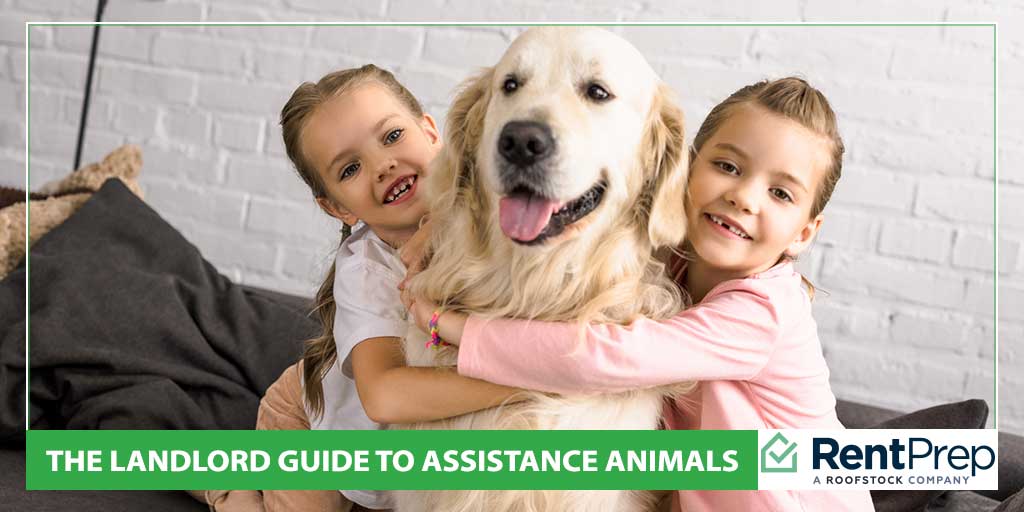
Let’s chat about animals in rental properties, shall we? It’s not uncommon for the subject for landlords and tenants to not see eye to eye. And, yeah, there is no doubt that some animals, despite assisting humans in some capacity, can be a bit destructive. But, that doesn’t change the fact that an animal is needed to assist a human in the first place. So, what is an ESA vs. a service animal?
Let’s get one thing clear, an assistance animal is not a pet. This means this isn’t information you’ll necessary discover when screening tenants or running a tenant background check.
So, what do you do when an applicant or tenant claims to have a medical need for an animal? Many landlords don’t know much about the laws surrounding the rights for people to have animals in a rental property.
Tenant requests for assistance animals are growing rapidly as more mental health studies show the benefits that animals have for certain mental and physical disabilities. In this article, we’ll go over what landlords should know about service and ESA animals including qualifications, laws and more.
Table Of Contents
- What Is An ESA?
- What Is A Service Animals?
- ESA vs. Service Animal
- What Are Reasonable Accommodations For Assistance Animals?
- FAQs On ESA & Service Animals
What Is An ESA?
An emotional support animal (ESA) or companion animal is one that helps people with mental disabilities. Studies show that often, people disabled with conditions like anxiety, depression, autism, or post-traumatic stress can alleviate symptoms with an emotional support animal. One of the major differences between a companion animal and a service animal is that there are no species or breed restrictions. In other words, an ESA could be a dog, cat, lizard, bird, monkey, ferret, snake or other creature.
The other major difference between a service animal and a companion animal is that they don’t need to have any training nor perform any physical
task. Their purpose is to provide companionship and comfort to the owner.
ESAs do not even need basic behavior training to qualify. The critical component of a companion animal for a disabled person must be that there is a significantly identifiable relationship between the tenant’s disability and the need for a companion animal.
In other words, the health care professional and the tenant must be able to show a nexus between what the companion animal provides and the person’s disability in order for the animal to qualify as more than just a pet who makes them feel good.
According to the Americans with Disabilities Act, an ESA does not qualify as a service animal and therefore they are not generally allowed in public places, like restaurants, as service animals are. The Fair Housing Act allows for companion animals in rental units but not necessarily in common areas like a pool area or courtyard.

ESA Laws & Requirements: What Landlords Should Know
In short, the laws create a situation where the qualifying standards are set fairly low for tenants to qualify for companion animals and many landlords feel frustrated at the restrictions the law places on them to be able to regulate animals in rental properties. Here’s an entire guide to emotional support animals.
The Federal Fair Housing Act and the Americans with Disabilities Act require landlords to provide reasonable accommodations for tenants with disabilities, and companion animals do qualify. Remember, to qualify for a companion animal, tenants must have a qualifying disability and be able to demonstrate a nexus.
Here are a few key points for landlords to know:
- Companion animals must follow the same reasonable rules that apply to pets as far as waste, leash restrictions damage, noise and safety.
- Landlords may have some say in setting limits on size, species, breed and number of companion animals and several tenant companion animal requests have been considered unreasonable and upheld by the courts, while others have not. For example, the court may find a single cat as a companion animal is reasonable, whereas five cats might easily be considered unreasonable.
- Landlords cannot charge pet deposits or pet fees because the law doesn’t consider companion animals as pets.
- Landlords can request a written statement from a health care provider confirming the tenant’s disability and the nexus of a companion animal and confirmation that its presence will ease the disability.
- Landlords can require health and wellness documentation for the companion animal, such as immunization/vaccination records and so forth.
- Landlords can still write warnings, deliver official notices or even evict the tenant and companion animal for things like excessive noise, property damage, behavior problems or whenever the companion animal might threaten the safety of other tenants.
- Landlords can refuse to allow certain companion animals if the animal will present undue hardship or expense for the landlord’s business. An example of this is when a landlord’s insurance company will raise rates or drop coverage for certain dog breeds to live on the property that are considered too aggressive, like pit bulls.
Many of the court cases involving landlords, tenants and animals center on the laws, rules and regulations about companion animals, not service animals.
To outsiders, it is difficult to distinguish between a companion animal and a pet. It’s important that you work closely with your attorney when it comes to tenant requests for companion animals to ensure you are following federal, state and municipal laws regarding reasonable accommodations.
That’s why we had Jaime Cane on our podcast to talk about landlord rights when it comes to emotional support animals. Jaime is an attorney with Boylan Code and she specializes in landlord-tenant law. In the podcast, we also chat about learn the “push back mechanics” for a landlord or property manager when it comes to ESAs.
Related: Listen to the Jaime Cane podcast.
What Is A Service Animal?
According to the Americans with Disabilities Act, a true service animal is a dog trained to provide assistance to the owner who has a disability. While in some special circumstances miniature horses can be licensed service animals, dogs are generally the only animals that legally can be true service animals.
Service animals must provide a function that the owner cannot do on their own. Perhaps the most familiar service animals are seeing eye dogs or guide dogs who help the blind get around. Other examples of service dogs include those for hearing impaired owners who rely on the dogs to alert them to sounds, dogs that pull wheelchairs or pick up things for wheelchair-bound owners, and dogs that are trained to alert owners of impending medical conditions like seizures or insulin imbalances.
The key factor in what elevates a service animal over a pet is training and documentation. Service animals are carefully trained by experts or their owners to do their tasks. A service animal’s owner might possess identification papers and the animal often wears some kind of identification collar or harness (but not always). Service animals are generally well trained, well behaved and take their “job” seriously.
Service Animal Laws & Requirements: What Landlords Should Know
The requirements for landlords to make allowances for a service animal to reside in a rental property are definitely addressed by The Federal Fair Housing Act and the Americans with Disabilities Act as a reasonable accommodation for tenants with disabilities. In other words, the courts consider a tenant’s use of a service animal as an accommodation that should exist outside any landlord’s no pet policy. You should be cautious in challenging a tenant’s right to a service animal.
Here are a few key points for landlords to know:
- Even if a landlord has a no pet policy in place, the law does not consider service animals as pets and therefore the service animal is exempt from such a restriction.
- Service animals are allowed anywhere a person would go, including food areas that would normally restrict an animal’s presence.
- Landlords cannot charge a pet deposit or pet fee for service animals, however the tenant is liable for any damage that the service animal may cause.
- Landlords can require written verification from the tenant’s health care provider that they are disabled but cannot ask for any specifics about the disability.
- Landlords can require written verification from the tenant’s health care provider that the service animal is needed.
- Landlords can request copies of the animal’s health records to prove the animal is in good health, parasite-free and immunized/vaccinated.
- Landlords can write warnings or even evict a tenant with a service animal if the animal is disturbing others, posing a threat to others or causing considerable damage to the property.
In other words, you can ask for appropriate paperwork concerning the tenant’s need for the service animal and to verify the animal’s health. Ultimately, for tenants with a diagnosable disability who require the assistance of a service animal, landlords must allow service animals in the rental unit and make reasonable accommodations for both the tenant and the animal.
ESA vs. Service Animal: What’s The Difference?
A good first step is to understand the difference between service animals and emotional support animals (ESA).
Here’s a great explanation on the differences from American Humane.
Service Animals:
Service animals are usually trained extensively to help individuals with a disability. to assist individuals with disabilities. They perform specific tasks, such as guiding the visually impaired or aiding in medical conditions. Here are some major factors of a service animal verses an ESA:
- Exemption from no-pet policies under the Americans with Disabilities Act (ADA).
- Specific accommodation requirements for service animals in rental properties.
- Verification and documentation of the an animal’s training and health.
Emotional Support Animals (ESA):
ESAs provide companionship and comfort to individuals with mental health disabilities. Unlike service animals, ESAs:
- Have no specific breed or species restrictions.
- Don’t require specialized training.
- Fall under the Fair Housing Act, requiring landlords to make reasonable accommodations.
- Demand a demonstrated nexus between the ESA and the tenant’s qualifying disability.
By understanding the differences between a service animal and an ESA, it can help landlords assist tenants with any specific assistance animal needs.
What Are Reasonable Accommodations For Assistance Animals?
Instead of learning the hard way and getting in trouble with the law for discrimination, learn what conditions must exist before you are required to allow assistance animals into your rental property.
Reasonable accommodations are defined as when a tenant asks a landlord to make a change in an existing rule or policy so they have an equal opportunity to enjoy the unit and surrounding property.
Disability Qualifications For Reasonable Accommodations

In April of 2013, the Housing and Urban Development clarified the conditions for assistance animals. Essentially, the ruling states that people with disabilities may request reasonable accommodations for any assistance animal, including emotional support animals.
HUD separates assistance animals into two categories–service animals and support or companion animals. It also sets up two conditions that, if the answers are yes, the landlord must allow the assistance animal.
Here are the two conditions:
- Does the person requesting the animal indeed have a diagnosed disability that that impacts major life activities?
- Does the person requesting the animal have a disability-related need for it and will the animal assist, perform tasks or perform services for the disabled person?
If it’s no to either, you do not have to allow the assistance animal. If it is yes to both, the exceptions must be made in most cases.
FAQs On ESA & Service Animals
Here are the most frequently asked questions when it comes to service and ESA animals in a rental property.
Is There A Pet Addendum I Can Add To A Lease?
We recommend going with the Pet Addendum provided by Rocket Lawyer. This addendum will give you further protections in your lease and the document was created by lawyers with landlords in mind.
The link above is an affiliate link and will not create any additional charge for landlords. It’s a reputable service that we rely on for specific addendums to the lease.
Can Landlords Deny Assistance Animals?
There are a few situations where you can deny assistance to animals, but in doing so, you run the risk of getting into legal trouble if you have not covered all your bases and consulted with your landlord-tenant attorney. So, can a landlord legally reject something like ESA?
Here are a few reasons a landlord could deny a tenant’s request for an assistance animal or start the eviction process against the tenant based on the animal:
- The tenant is not legally disabled or cannot prove it in writing via a health care professional.
- The assistance animal is not prescribed for the treatment of the tenant’s specific disability or no nexus is demonstrated or backed up in writing by a health care professional.
- The assistance animal would create an undue burden, such as keeping a miniature horse in a high-rise apartment where there is no facility for housing such an animal.
- The assistance animal is illegal or otherwise not allowed according to state or municipal law, such as an exotic animal or a dangerous breed of animal.
- The animal is a direct threat to the health and safety of other tenants which cannot be reduced or eliminated.
- The assistance animal creates “an undue financial burden or administrative burden on the landlord.”
- The presence of the animal “fundamentally alters the nature of the housing provider’s operations.”
- The tenant won’t take responsibility for the animal, such as cleaning up waste, letting it run free, or resolving noise problems.
Each of these situations are reflected in a handful of court rulings that went in favor of the landlord. However, you should definitely consult with an attorney before issuing notices, warnings, or starting the eviction process against a tenant with an assistance animal to ensure you stay clear of any violations.
How Can I Tell If An ESA Letter Is Fake?
One thing landlords everywhere should be aware of is the growing trend for applicants and tenants to present fake assistance animals in order to skirt standard pet rules and fees. There are plenty of websites that will allow people to register a dog as a “service” dog and provide a badge or vest with a certificate, just for a fee.
Other people may try to present forged doctor or therapist note about a companion animal in an attempt to get around a landlord’s no pet policy. If you suspect this is the case, it’s okay to look the medical professional up on the state licensing board and verify their identity. It’s also acceptable to contact the letter writer’s office and explain yourself and ask for confirmation that the medical professional did indeed write the letter. A quick internet search can also weed out a fee-based certification or companion animal setup as well.
Landlords should be careful not to give the impression that they are harassing or otherwise doubting the tenant’s request, but simply doing due diligence in confirming the document. Fair housing laws generally require that the person providing a tenant’s documentation about the disability must be a person “who is in a position to know” about the tenant’s disability. It’s entirely within your rights to confirm that a legitimate health professional has prescribed the companion animal for the tenant.
In short, examining a tenant’s request for an assistance animal is quite complicated and there is no quick way to figure out the various facets of each individual case. With the help of a landlord tenant attorney and becoming familiar with the laws in place, landlords can better navigate the murky waters of assistant animals in rental properties.
How Is My Rental Property Insurance Affected?
Many times renters and landlord confuse the difference between a service dog and an emotional support animal. A landlord cannot deny a renter the rights to a legitimate service dog. However, if there are restricted breeds according to their insurance policy they will need to consult with their insurance company to make sure they won’t lose insurance based on the breed of the animal.
According to HUD.gov, “Breed, size, and weight limitations may not be applied to an assistance animal.” This, however, is debated because some insurance companies have restricted breeds on their policy. Some landlords refuse service animals if their insurance policy will be dropped. This is something the landlord should discuss with their insurance agency.
Do You Have Any General Advice For ESAs?
Sure do! Tracy Streich of Renters Place in Tulsa, OK joined us for a live Facebook interview. He manages over 500 single family homes and has a lot of experience dealing with tenants and ESAs. Take a listen at what he has to say about tenant requests for having an ESA.
The Gist Of Assistance Animals
In a nutshell, a tenant’s request to have an assistance animals, backed up by the proper documentation is something that every landlord should know how to handle. From service animals to ESAs, there are specific accommodations that a landlord needs to follow in order to make the renter and their animal suited for a rental property.

